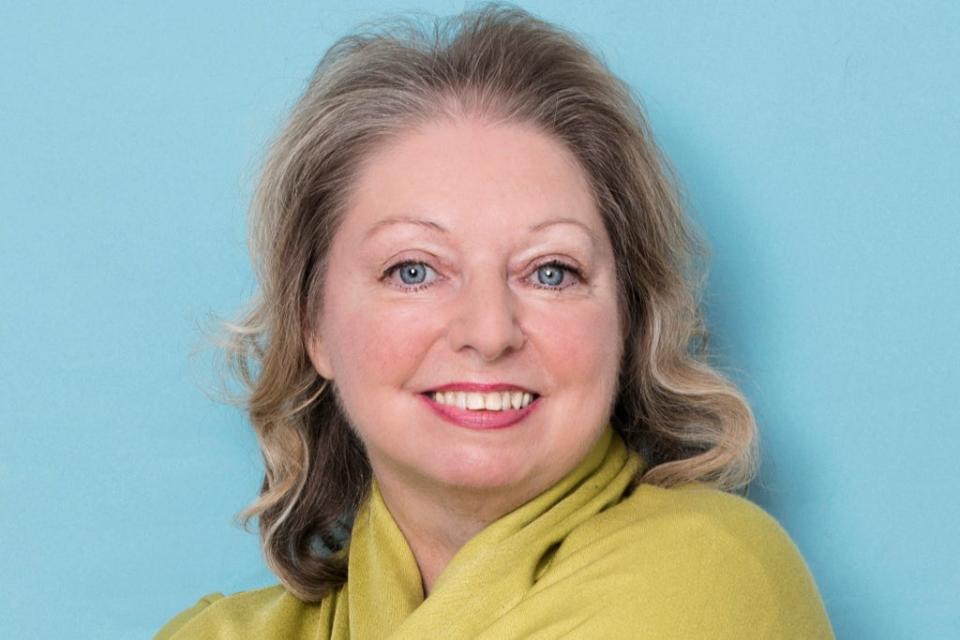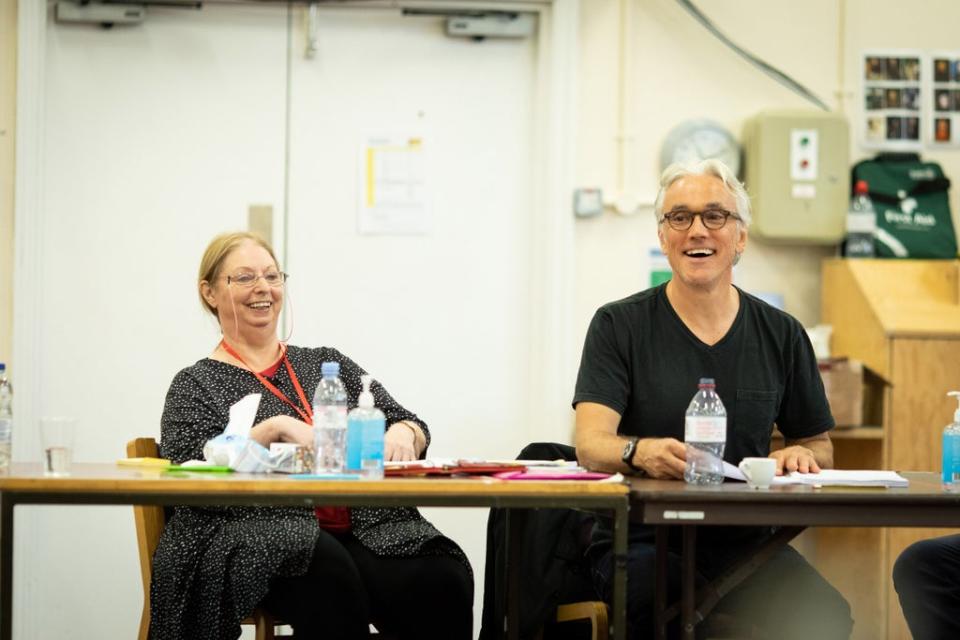Hilary Mantel interview: ‘Monarchy is a trap — but I was sorry Meghan Markle left us’

“I must admit, I love Meghan Markle,” says Hilary Mantel. “She cheered me up no end; I just love to see her shining face.” Mantel speaks in a soft, conspiratorial voice, holding my gaze with her large blue eyes. “I love what she wears. I was so sorry she left because I thought that took some of the jollity out of life.” The author knows that saying this will ruffle feathers. When she spoke about the Duchess of Cambridge in 2013, describing her as “a jointed doll on which certain rags are hung”, it caused mass outrage. Her story The Assassination of Margaret Thatcher had a similar effect and most recently, she has spoken out against Brexit. She and her husband Gerald “believe it is a destructive move for this country” and are planning to move to Ireland partly because of it (and partly to renew old ties - Gerald is an Irish citizen and Mantel’s family have roots there).
So she looks mischievous as she speaks about Markle. We are supposed to be discussing the stage adaptation of Mantel’s multimillion-copy-selling novel, The Mirror and the Light, the final part of her Booker prize-winning Wolf Hall trilogy that presented a new side to Thomas Cromwell and brought the reign of Henry VIII into the zeitgeist.
She has written the script with Ben Miles, who played Cromwell in adaptations of Wolf Hall and Bring Up The Bodies and reprises the role here. He was one of the first readers of the third book as it evolved and Mantel speaks fondly of him. “I sent him chunks of the novel, to alleviate the loneliness of it just being me and Cromwell”. “The conversations we had during the first two plays fed into the third book because he had a kind of inside track on Cromwell. The questions he would ask me would stimulate me to invent because I think when you portray the character over a long span of time you want a little bit more, to keep it fresh. Working with him made the whole thing multidimensional, so Cromwell is breathing”.
We have met at a rehearsal space in Clapham where the cast are doing a read-through. Pictures of the characters are pinned up on the walls, along with a map of Henry VIII’s London and the female actors wear long padded skirts over their jeans and t-shirts to get a sense of how their characters would have moved. Director Jeremy Herrin is discussing how Olivia Marcus, who plays Jane Seymour, should deliver an innuendo-heavy line about what the King expects of his new wife. As in the novels, the dialogue is deft, and often unexpectedly funny.

Mantel watches, a beatific smile on her face. If her life had panned out differently, she would have liked to work in theatre and has always enjoyed writing dialogue. “I always had that sneaking feeling that [writing novels] was not quite what I should be doing,” she says. “But then very late in one’s career the chance presents itself.” She is 69 but has a girlish air, wearing blue Mary Janes, her straight blonde hair pulled back in a ponytail with a grey scrunchie. It is tempting to make sweeping parallels between the world of Wolf Hall and today’s fragmented nation and painful break from Europe. But Mantel “tends to resist” comparisons. “Situations were sharper then; you didn’t resign if you made a mistake but could land in the Tower”. A realisation dawns on her: “Of course in the present government they don’t resign, they just carry on. But what I do know is that this strikes home to people in the present day because these are such big archetypal figures and we see our own struggles in them, they are like gigantic mirrors to our small concerns, playing out psychological dramas to do with power and sex and money and courage and victimhood, all those huge things that run through every life. And it is what royalty does, playing out these dramas on a stage that is timeless.”
Mantel is polite in her critique of the monarchy. “I have nothing but respect for people trying to behave well within roles they didn’t choose. But there is a huge difference between being a celebrity and being a royal and I think that probably the older generation at the palace were aghast that Meghan couldn’t see that — and why should she? I feel the monarchy is a burden that each one gladly assumes but it is a trap for them.” There is a generational divide. “The Prince of Wales takes his role every bit as seriously as the Queen does. There’s a spiritual input there. But I don’t know if the young generation feel that same sense of duty. It would be really interesting to hear what William thinks is the world of the monarchy — but what is the platform for him to do that?”
There are further comparisons between the court of Henry VIII and Saudi Arabia, where Mantel lived for four years while Gerald, a geologist, was working there. Mantel wrote about this time in her novel Eight Months on Ghazzah Street (1988), which explores the tensions between Islamic cultures and Westerners as well as women and men — being played out now the Taliban continue their brutal takeover of Afghanistan, eviscerating women’s rights.
Living in Saudi Arabia you had to tear up all your western liberal assumptions about what people wanted.
“I am one of the few people around who is a writer who lived in an absolute monarchy and not only that but a theocracy,” she says. “The thing that strikes home about this whole debacle in Afghanistan is that a generation of women is maybe now stranded and the ones that had some education can’t use it. But at the same time we have to not be arrogant, not speak for what those women want because they will tell us themselves but don’t assume it’s the same as what a western secular woman would want.” Life in Saudi Arabia “was in many ways like talking to women before a feminist consciousness. You had to tear up your western liberal assumptions about what people wanted and the whole attitude to life and fate.”
Mantel grew up in Derbyshire and was a Catholic until the age of 12 (it has left her with a permanent sense of guilt). When she was seven, the family took in a lodger. When she was 11, her father left and the lodger, Jack Mantel, became Mantel’s stepfather. She took his surname. She also suffered from a mysterious pain ever since she was a teenager. It wasn’t until she was 27 that she diagnosed herself with endometriosis and doctors eventually removed her womb and ovaries.
Women are still treated “shockingly” in medicine, she says. “Drugs are tested on men because it is easier to insure them as you can make sure they aren’t pregnant. This protocol was set years and years ago and it poses problems for things like pain relief where women’s bodies react differently to drugs. The assumption that he and she are the same just doesn’t hold in medicine. It has taken a lot of time to get round to thinking about this.”
Being a woman means a lot to Mantel and she spoke this month about being misgendered, referred to as “they” not “she” in a university publication. She said she “had not given my consent to… have my womanhood confiscated in print”. The climate of criticism around gender is upsetting and attacks on JK Rowling are “unjustified and shameful”.
The body is also central in the Wolf Hall trilogy. Henry VIII is “losing his confidence in himself as a man; his psychological state is being complicated by what is happening to his body and this makes him unpredictable; there are days where he is relatively ok and days where he is in pain, all of this is encased in a frail shell.”
But Mantel does not want to be an authority on any of her characters. Cromwell is “not my possession, he is ours now”. She and Miles are working together on a photography book with his brother. It is called the Wolf Hall Picture Book and shows contemporary pictures of the places mentioned in Wolf Hall: “It’s the places where the past and present run up against each other and it’s the friction we are interested in; what is in the corners — bits of frayed wiring or curled up carpet, the nuts and bolts of what hold history together. The photos are rather sardonic, rather funny actually.”
Where does her interest in history come from? “I was lucky enough to have an inspiring history teacher myself,” she says. “I wouldn’t describe her as a storyteller- she made it clear that it was a tough critical discipline, and looking back I am struck not only by her effortless grasp of what she was teaching but by the fact that from the time I was twelve - my age when she began to teach my class- she treated us as adults. We responded accordingly. She taught me right the way through A Level and I am forever grateful.”
She is writing another novel but does not think she will be able to do much on it this year. We are interrupted by Gerald peering around the door, ready to pick Mantel up. They don’t know when they will leave for Ireland or where they will live. “It is a big move at our time of life,” she says. “And likely to be our last move, so we won’t do anything in a hurry, and naturally we will regret leaving our Devon life - we live opposite the beach in Budleigh, with astonishing views, and have been happy here for over ten years, in a small but lively town with excellent music and literary festivals. There will be much to miss - but nothing is final yet.”
She lifts up her handbag and strolls out, talking about the play: “You see the nuance of each character. You never bolt the door on any interpretation, you just open doors all the time to fresh thinking. There is such a lot of mileage in it.”
The Mirror and the Light is on at the Gielgud Theatre, rsc.org.uk
Read More
Hilary Mantel says Prince Andrew’s legal case not a ‘constitutional problem’
Hilary Mantel's The Mirror and the Light lives up to its Booker-winning predecessors

 Yahoo Finance
Yahoo Finance 